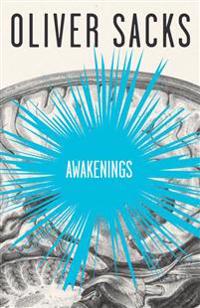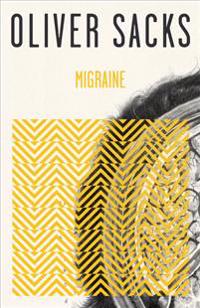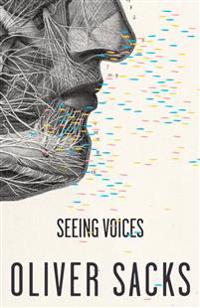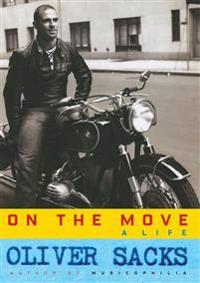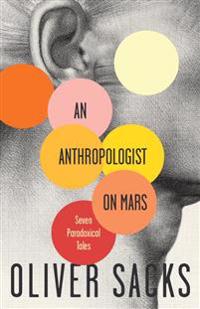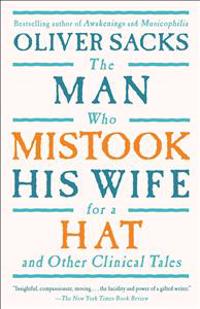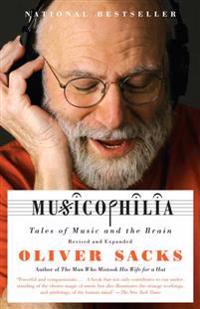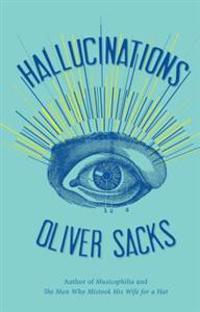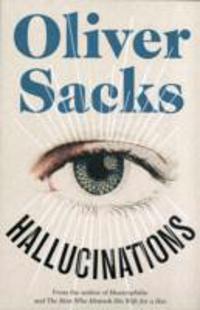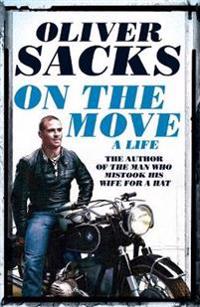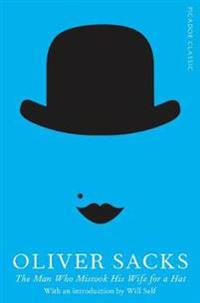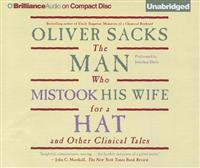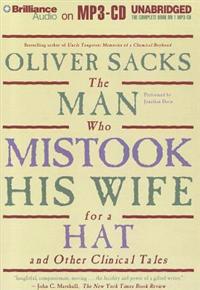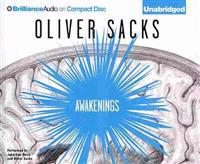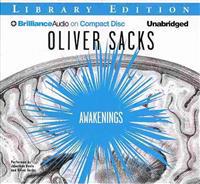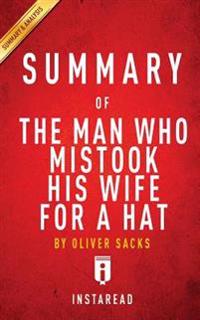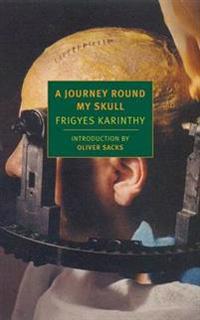Uncle Tungsten: Memories of a Chemical Boyhood (Häftad)
avOliver W. Sacks
ISBN: 9780375704048 - UTGIVEN: 200209The scientific wonder of youth is skillfully evoked in this intriguing memoir by the distinguished neurologist and author of Awakenings in which he describes his fascination with metals, gases, and chemicals, especially "Uncle Tungsten," and with unravelling the complex mysteries of the world around[...]
Awakenings (Häftad)
avOliver W. Sacks
ISBN: 9780375704055 - UTGIVEN: 199910"Awakenings"--which inspired the major motion picture--is the remarkable story of a group of patients who contracted sleeping-sickness during the great epidemic just after World War I. Frozen for decades in a trance-like state, these men and women were given up as hopeless until 1969, when Dr. Olive[...]
Migraine (Häftad)
avOliver W. Sacks
ISBN: 9780375704062 - UTGIVEN: 199910"Balanced, authoritative . . . brilliant." --The London Times
"Written by one of the great clinical writers of the twentieth century, Migraine . . . should be read as much for its brilliant insights into the nature of our mental functioning as for its discussion of the migraine." --The [...]Seeing Voices (Häftad)
avOliver W. Sacks
ISBN: 9780375704079 - UTGIVEN: 200011Like The Man Who Mistook His Wife for a Hat, this is a fascinating voyage into a strange and wonderful land, a provocative meditation on communication, biology, adaptation, and culture. In Seeing Voices, Oliver Sacks turns his attention to the subject of deafness, and the result is a deeply felt por[...]
On the Move: A Life (Inbunden)
avOliver Sacks
ISBN: 9780385352543 - UTGIVEN: 2015-04When Oliver Sacks was twelve years old, a perceptive schoolmaster wrote in his report: "Sacks will go far, if he does not go too far." It is now abundantly clear that Sacks has never stopped going. From its opening pages on his youthful obsession with motorcycles and speed, "On the Move" is infused [...]
An Anthropologist on Mars: Seven Paradoxical Tales (Häftad)
avOliver W. Sacks
ISBN: 9780679756972 - UTGIVEN: 199602To these seven narratives of neurological disorder Dr. Sacks brings the same humanity, poetic observation, and infectious sense of wonder that are apparent in his bestsellers "Awakenings" and "The Man Who Mistook His Wife for a Hat." These men, women, and one extraordinary child emerge as brilliantl[...]
The Man Who Mistook His Wife for a Hat (Pocket)
avOliver W. Sacks
ISBN: 9780684853949 - UTGIVEN: 199804In his most extraordinary book, "one of the great clinical writers of the 20th century" (The New York Times) recounts the case histories of patients lost in the bizarre, apparently inescapable world of neurological disorders. Oliver Sacks's "The Man Who Mistook His Wife for a Hat" tells the stories [...]
Musicophilia: Tales of Music and the Brain (Häftad)
avOliver Sacks
ISBN: 9781400033539 - UTGIVEN: 200809Revised and ExpandedWith the same trademark compassion and erudition he brought to "The Man Who Mistook His Wife for a Hat," Oliver Sacks explores the place music occupies in the brain and how it affects the human condition. In "Musicophilia," he shows us a variety of what he calls "musical misalign[...]
Musicophilia: Tales of Music and the Brain (Inbunden)
avOliver Sacks
ISBN: 9781400040810 - UTGIVEN: 200710Drawing on the individual experiences of patients, musicians, composers, and everyday people, the author of Awakenings explores the complex human response to music, detailing the full range of human reactions to music, what goes on and can go wrong when we listen to music, and how music can affect t[...]
Hallucinations (Inbunden)
avOliver W. Sacks
ISBN: 9781410457318 - UTGIVEN: 2013-04Have you ever seen something that wasn't really there? Heard someone call your name in an empty house? Sensed someone following you and turned around to find nothing?
Hallucinations don't belong wholly to the insane. Much more commonly, they are linked to sensory deprivation, intoxication, illn[...]Hallucinations (Inbunden)
avOliver Sacks
ISBN: 9781447208259 - UTGIVEN: 201211Have you ever seen something that wasn't really there? Heard someone call your name in an empty house? Sensed someone following you and turned around to find nothing? Hallucinations don't belong wholly to the insane. Much more commonly, they are linked to sensory deprivation, intoxication, illness, [...]
Hallucinations (Pocket)
avOliver Sacks
ISBN: 9781447208266 - UTGIVEN: 2013-08-29Have you ever seen something that wasn't really there? Heard someone call your name in an empty house? Sensed someone following you and turned around to find nothing? Hallucinations don't belong wholly to the insane. Much more commonly, they are linked to sensory deprivation, intoxication, illness, [...]
Oaxaca Journal (Storpocket)
avOliver Sacks
ISBN: 9781447208341 - UTGIVEN: 201207Oliver Sacks, the bestselling author of Awakenings and The Man Who Mistook His Wife for a Hat, is most famous for his studies of the human mind: insightful and beautifully characterized portraits of those experiencing complex neurological conditions. However, he has another scientific passion: the f[...]
Hallucinations (Häftad)
avOliver Sacks
ISBN: 9781447224518 - UTGIVEN: 201211Hallucinations, for most people, imply madness. But there are many different types of non-psychotic hallucination caused by various illnesses or injuries, by intoxication - even, for many people, by falling sleep. From the elementary geometrical shapes that we see when we rub our eyes to the complex[...]
On the Move (Häftad)
avOliver Sacks
ISBN: 9781447264057 - UTGIVEN: 2015-05Few people can claim to have made such a profound impact on the public understanding of the brain and its inner workings. In this book, Oliver Sacks describes his time at Oxford University, his time spent in San Francisco and Los Angeles in the early nineteen sixties, before moving on to chart his p[...]
The Man Who Mistook His Wife for a Hat (Häftad)
avOliver Sacks
ISBN: 9781447275404 - UTGIVEN: 2015-01With an introduction by Will Self A classic work of psychology, this international bestseller provides a groundbreaking insight into the human mind. If a man has lost a leg or an eye, he knows he has lost a leg or an eye; but if he has lost a self - himself - he cannot know it, because he is no lo[...]
The Man Who Mistook His Wife for a Hat: And Other Clinical Tales (CD-bok)
avOliver W. Sacks, Jonathan Davis
ISBN: 9781455883608 - UTGIVEN: 2012-10In his most extraordinary audiobook, one of the great clinical writers of the twentieth century ("The New York Times") recounts the case histories of patients lost in the bizarre, apparently inescapable world of neurological disorders. Oliver Sacks s "The Man Who Mistook His Wife for a Hat" tells th[...]
The Man Who Mistook His Wife for a Hat: And Other Clinical Tales (Övrigt)
avOliver Sacks, Jonathan Davis
ISBN: 9781455884384 - UTGIVEN: 201210In his most extraordinary book, ?one of the great clinical writers of the twentieth century? (The New York Times) recounts the case histories of patients lost in the bizarre, apparently inescapable world of neurological disorders. Oliver Sacks's The Man Who Mistook His Wife for a Hat tells the stori[...]
Awakenings (CD-bok)
avOliver W. Sacks
ISBN: 9781480530379 - UTGIVEN: 2013-06Compulsively readable. . . . Dr. Sacks writes beautifully and with exceptional subtlety and penetration into both the state of mind of his patients and the nature of illness generally. . . . A brilliant and humane book. A. Alvarez, The Observer Awakenings which inspired the major motion picture is t[...]
Awakenings (CD-bok)
avOliver Sacks
ISBN: 9781480530393 - UTGIVEN: 201306?Compulsively readable. . . . Dr. Sacks writes beautifully and with exceptional subtlety and penetration into both the state of mind of his patients and the nature of illness generally. . . . A brilliant and humane book.? ? A. Alvarez, The Observer Awakenings ? which inspired the major motion pictur[...]
The Man Who Mistook His Wife for a Hat: And Other Clinical Tales (Övrigt)
avOliver Sacks, Jonathan Davis
ISBN: 9781491514078 - UTGIVEN: 2014-04In his most extraordinary audiobook, ?one of the great clinical writers of the twentieth century? ("The New York Times") recounts the case histories of patients lost in the bizarre, apparently inescapable world of neurological disorders. Oliver Sacks's "The Man Who Mistook His Wife for a Hat" tells [...]
N3ur0r3lat05: Ficciones Dendriticas, En Homenaje a Oliver Sacks (häftad)
ISBN: 9781500716660 - UTGIVEN: 2014-08The Man Who Mistook His Wife for a Hat: By Oliver Sacks Key Takeaways, Analysi: And Other Clinical Tales (häftad)
ISBN: 9781517467593 - UTGIVEN: 2015-09Migraine Art (Inbunden)
avKlaus Podoll, Derek Robinson, Oliver W. (FRW) Sacks
ISBN: 9781556436727 - UTGIVEN: 2009-02A Journey Round My Skull (Häftad)
avFrigyes Karinthy, Oliver Sacks
ISBN: 9781590172582 - UTGIVEN: 200803


